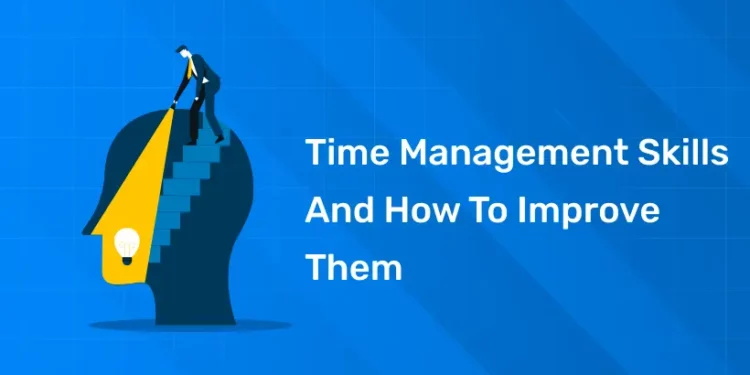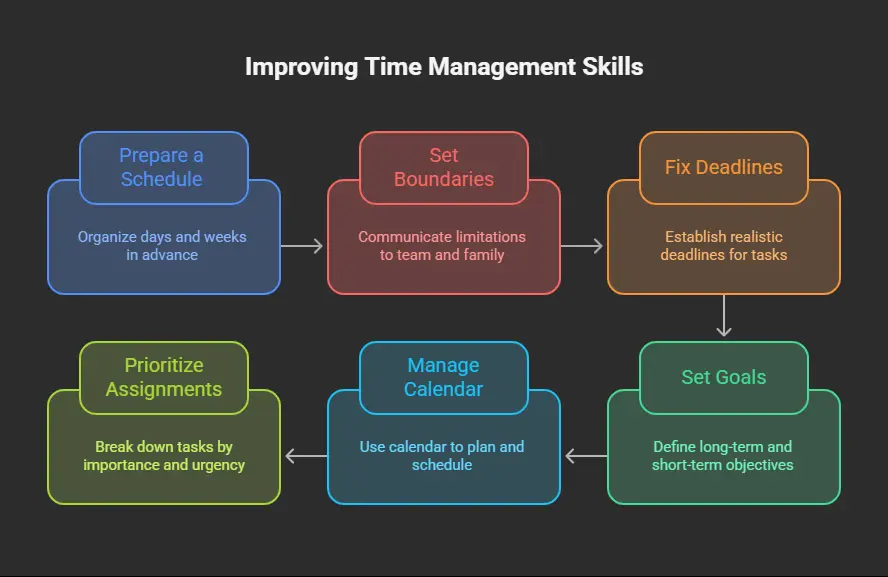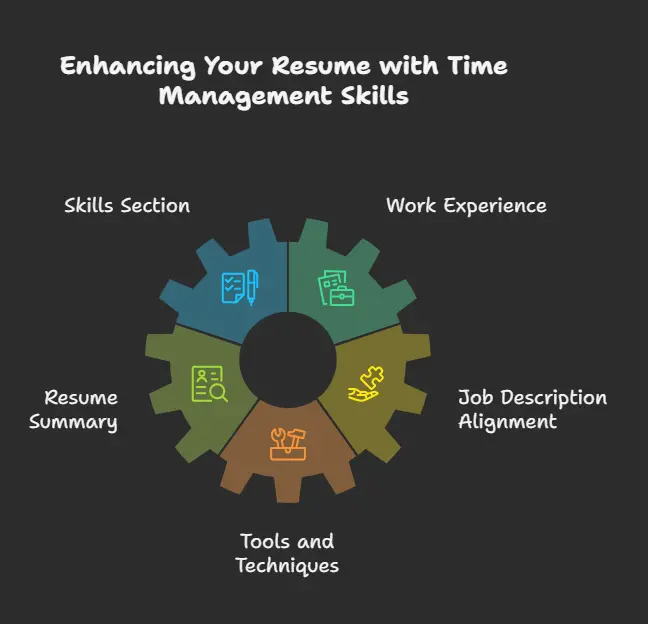Table of Contents
Time is one of our most valuable resources, yet it often feels like there’s never enough of it. Whether you’re a student, a professional, or managing a busy home life, learning how to manage your time well can make a big difference. Good time management helps you stay organized, reduce stress, and get more done without feeling overwhelmed.
In this blog, we’ll explore what time management skills are, why they matter, and how you can start improving them today. With a few simple changes and practical tips, you can take control of your time and make each day more productive and balanced.
Begin Your Personality Transformation- Enroll Today!
Introduction
Time management is the most important skill you can develop, both in your personal and professional life. This helps you keep organized, reduce stress, and take maximum benefit from each day. When you manage your time well, you are more likely to meet deadlines, keep you focused and achieve your goals without feeling without disturbed.
Whether you are a student, employee or business owner, time management allows you to do smart work – not difficult. This gives you control over your tasks, helps you determine clear preferences and provides more space for comfort, development and balance. Strong time management skills lead to better results and more productive leading to balanced life.
Time Management Skills
Time management skills are abilities that help you use your time effectively and efficiently. These skills allow you to plan, prioritize and complete all tasks on time without feeling distracted. Whether you are a student, professional or an entrepreneur, strong time management helps you to do more work, reduce your stress and improve the quality of your work in a good manner.
Key Time Management Skills
Here we are providing some of the most important time management skills,
-
Priority: Understanding which tasks is most important and tackling them first without any delay.
-
Planning: Create a plan or to-do list to map out your day or week.
-
Goal Setting: Determine a short-term and long-term goal to stay focused.
-
Organization: Keeping your workspace, tasks, and schedule in order to maintain.
-
Focus: Staying on track and avoiding each distractions.
-
Delegation: Checking when and how to assign tasks to others.
-
Decision-Making: Making quick, thoughtful choices to stay productive.
-
Stress Management: Handling pressure without losing track of time or priorities.
Priority:
Priority is the key to successful time management. When you prioritize your daily tasks, you make sure you first complete important tasks. Write each task that starts with the highest priority. For example, you can break your tasks as the following:
- A-level tasks: Things that will lead to great results if not done today
- B-level tasks: Activities that can affect negatively if they are not completed today
- C-level tasks: Activities that have no result if not completed today
Planning:
Plan is the origin of time management. With a right plan, you can prioritize your features accordingly, which can help avoid confusion and unnecessary stress. A planned task plan helps to complete the tasks in the given time limit. For example, a plan for a project manager may include supplies, work plans, obtain appropriate permits and so on.
Goal Setting:
Goal setting is the process of defining your goals and goals with a certain plan to help you achieve the prescribed goals. Setting goals is an important step in excellent performance as a professional. Without goals, you can find challenging to complete your tasks in a well -organized way. Determining both short and long -lasting goals can lead to success in your career. An example of a short -term goal may be to increase sales of 40%in your department. A long -term goal may be something like completion of the law school or start your own business.
Organization:
Staying organized helps you keep up with your responsibilities and priorities, such as what you need to do first and when to do it. An organized list of tasks acts as a map to guide you from morning to evening and helps increase productivity. A streamlined plan helps you share big goals into small, easily achievable tasks and allow you to complete these tasks on time.
Flexibility:
It is important that you maintain some flexibility in your schedule. Often, a task will take more time than your expectation or supervisor will give you a priority task you did not expect. Be clearly aware of your daily program where you have room to adapt to preparations for the last minute changes.
Communication:
Communication skills are an important part of success in life. Effective communication promotes trust and makes your plans and goals ready for those you work with. This plays an important role in resolving conflicts and preventing possible conflict situations. Strong communication helps you leave more work, which allows you to focus more on important tasks that support your goals.
Delegation:
Managing many tasks is satisfactory an important process. When managing a project, you can hand over some tasks to the subordinates. This will help reduce your workload so that you can focus more on important tasks, such as planning, business analysis and others.
Stress Management:
Positive handling of stress inspires you and helps you complete the complete tasks at the scheduled time against all adversity. Having snacks during exercise, yoga or brake can help you reduce stress. In fact, including stress maintenance activities or self -care rituals in your daily plan, can actually affect your productivity on work -related work throughout the day.
Why Time Management Matters
Good time management helps you to:
-
Meet deadlines
-
Work smarter, not harder
-
Avoid burnout
-
Balance work and personal life easily
-
Increase productivity and job performance without any delay
Boost Your Skills & Kickstart Your Career!
Employability and Personality Development Course by Entri App: Enhance your communication, confidence, and job-ready skills to excel in your career.
Join Now!How to improve Time Management Skills
Improving time management skills begin by knowing how to spend your time in the present and it can be used better. Set clear goals, prefer tasks and make a daily plan that works for you. Use tools consisting of to-do lists, calendars or apps to keep you well prepared. Avoid multitasking, take regular break and learn to say no to someone when needed. With daily practice and reliability you will be more concentrated, productive and under control.
1. Prepare a schedule and follow it strictly
Arrange your days and weeks well before you get started. It can be unexpected situations, so remember the types of challenges that arise in your work and budget time around your duties and responsibilities. Whatever you do, spend a few days tracking it. This will help you identify recurrent tasks, which you can include in your schedule.
2. Set some boundaries for yourself
To complete the tasks on time without any confusion, you must inform the team and other group members about your limitations and when you are not available. Be sure to communicate your restrictions in a humble and direct manner. Make it clear to everybody which hours of the day you prefer not to be disturbed at all, except in an emergency case. During these times, you can put your phone to do-not-disturb mode and turn off any chat apps on your computer, so you can focus especially on work.
3. Fix deadlines
When you have urgent work, you can set a realistic deadline and follow it strictly. Whenever possible, it should be a deadline a few days before the date of delivery, so that you can review the tasks and take corrective measures. Follow the progression of the work and provide timely response to ensure that the project is not distracted from another source.
4. Set long-term and short-term goals
Set at least one long-term goal that you wish to achieve. These goals give an idea of what direction you want your life to go in. However, every long-term goal needs related short-term goals as well, as they keep you on track and motivate you to realise your long-term goals. For example, if your objective is to get a promotion within six months, you need to set the short-term goal of improving certain skill sets related to the new position. Your goals should follow the SMART goal strategy to be Specific, Measurable, Achievable, Relevant and Time-based.
5. Manage your calendar effectively
A calendar is one of the most important tools to manage your time, productivity and effectiveness. A calendar allows you to stay caught up on your appointments while giving you a physical space to plan what you need to do first and when, why your involvement is required and what you can complete at a later date. You might consider reserving certain brackets of time regularly for meetings or important tasks.
6. Prioritise your assignments
Priority is one of the backbone of productivity, as it can help with everything from time management to balance between work and life. You can practice prioritization by including tasks in a main list and then breaking the daily goals, weekly goals and monthly goals. One way to help you prioritize your plan is to set time limits to important tasks:
- Important, but not time-limited task: Determine when you want to do and plan them in your calendar.
- Time-bounded task: Add them to your immediate to-do-list. If necessary, find team members to help you fulfill their time limit.
How to add Time Management Skills to your Resume
Time management is a valuable skill that employers look across in all industries. This indicates that you can prioritize tasks, complete before the deadline, keep you organized and work effectively – quality that is important in every role. If you want your CV to stand out, it is important to show how you have used time management skills in real work situations. Here’s how to effectively add time management skills to your CV:
1. Include It in Your Skills Section
In the skills section of your CV, you can list “Time management” as your soft skill. To make it more meaningful, you can include it with related skills, such as:
-
Time Management
-
Task Prioritization
-
Deadline Management
-
Organizational Skills
-
Planning and Scheduling
Keep this section concise and focused on the skills that best match the job description.
2. Show It Through Your Work Experience
Instead of listing “time management” as a skill, it is more effective to show how you used it. Use specific examples in your work experience section with action verbs and average results.
Example 1: Managed several client projects simulataneously, meeting all deadline continuously and improved up to 20% during the total project distribution period.
Example 2: Priority of daily tasks in a fast-paced office, resulting in an increase in efficiency and completed 100% tasks on-time over 6 months.
Example 3: Planned and coordinated weekly team meetings, and make sure the all the tasks were completed before the deadline and the team’s goals were met.
These examples clearly show your time management skills in real situations.
3. Mention It in Your Resume Summary or Objective
If time management skill is one of your strength, then your resume is a great place to highlight it accordingly. This can quickly capture the attention of the hiring officer.
Examples: Detail-oriented professional with strong time management skills, experienced many projects and contineously meeting the deadlines all time.
4. Tailor It to the Job Description
Each work is different, so read the job posting carefully. If the job description highlight on meeting deadline, handling many tasks or working under pressure, make sure your resume or CV shows how your time management skills match these needs.
5. Support It with Tools or Techniques You Use
If you are using time management tools such as Trello, Asana, Google Calendar, or time-tracking apps, consider the including them in your resume or CV ,certainly when the job requires a technical service organization.
Examples: Project management tools Trello and Google Calendar to track tasks, meet deadlines and keep the team members informed.
Begin Your Personality Transformation- Enroll Today!
Conclusion
Time management is a skill that everyone can learn and improve with practice. When you manage your time well, you can do more work, feel less stressed, and there is more time to do things you like. All this is about making small, smart changes on how to plan and spend your day.
Start by setting clear goals, create a daily plan and stay focused on one task at a time. Use tools that best for you, take regular break, and if things are not always run according to the plan, do not forget to make you kind. With stability and effort, better time management will be a natural part of your routine.
| Related Links | |
| Top Communication Skills For A Resume | Verbal Communication Skills: Examples & How To Improve Them |
| Cover Letter Do’s and Dont’s | What Does a Group Leader Do? |
Boost Your Skills & Kickstart Your Career!
Employability and Personality Development Course by Entri App: Enhance your communication, confidence, and job-ready skills to excel in your career.
Join Now!Frequently Asked Questions
What are time management skills?
Time management skills are the abilities that help you plan, organize, and control how much time you spend on specific tasks. These skills include setting goals, prioritizing tasks, planning ahead, staying focused, and managing distractions. Good time management leads to better productivity and less stress.
Why are time management skills important?
Time management is important because it helps you make the most of your day. When you manage your time well, you can meet deadlines, reduce stress, avoid last-minute rushes, and create more free time for yourself. It also improves the quality of your work and helps you maintain a better work-life balance.
What are some common time management mistakes?
Some common mistakes include procrastination, failing to prioritize tasks, multitasking too much, overcommitting, and not using a schedule or to-do list. These habits can lead to wasted time, missed deadlines, and lower productivity. Learning to recognize and avoid these mistakes is key to better time management.
How can I start improving my time management skills?
Start by tracking how you currently spend your time. Identify where you’re losing time and what tasks take longer than they should. Then, create a daily or weekly plan, set priorities, and break larger tasks into smaller, manageable steps. Use tools like calendars, to-do lists, or productivity apps to stay on track.
What are some effective time management techniques?
Popular techniques include the Pomodoro Technique (working in 25-minute intervals with short breaks), time blocking (assigning specific times to tasks), the Eisenhower Matrix (prioritizing tasks based on urgency and importance), and setting SMART goals. These methods help you stay focused and manage your time more effectively.
Can time management help reduce stress?
Yes, managing your time well can significantly reduce stress. When you have a clear plan and know what to focus on, you feel more in control of your day. It helps you avoid last-minute pressure, prevents burnout, and gives you time to rest and recharge.













